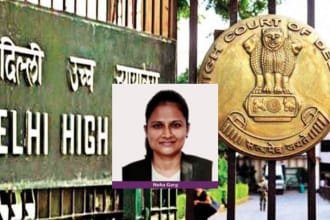In a significant observation during the hearing of a surrogacy-related plea, the Supreme Court of India flagged a critical constitutional and demographic issue that may reshape India’s political future—population-based delimitation. A Bench comprising Justices BV Nagarathna and Satish Chandra Sharma remarked that basing delimitation purely on population could unfairly disadvantage South Indian states, which have demonstrated responsible population control, in contrast to the relatively higher population growth in North India.
Delimitation and the Demographic Dilemma
Delimitation refers to the redrawing of the boundaries of electoral constituencies based on demographic changes. The primary purpose is to ensure equal representation for equal segments of the population. However, when population becomes the sole criterion, states with higher population growth—primarily in the North—could gain more parliamentary seats, while those in the South could lose representation despite performing well on key developmental indicators, including family planning, literacy, and healthcare.
Justice BV Nagarathna observed:
“See South (India), family sizes are reducing. That is what the issue is with delimitation. The population of the south will decrease now… With North expanding their families.”
This remark has rekindled the debate around whether population control should be penalized or rewarded in a federal democratic setup. It also raises concerns about the political implications for Southern states that have historically invested in social welfare and education.
Surrogacy Debate Sparks Broader Constitutional Commentary
The context for this demographic observation was a case involving parents seeking permission to pursue surrogacy after unsuccessful fertility treatments. During the proceedings, the Bench questioned the necessity of resorting to surrogacy after the successful birth of one child through natural means.
“We can understand one child. But now first child normally and then now this through In Vitro Fertilisation (IVF)?” Justice Nagarathna asked, expressing a note of skepticism regarding the increasing demand for assisted reproductive technologies in non-critical situations.
The Court further commented on the growing trend of surrogacy being influenced by popular culture, particularly Bollywood, stating:
“After all these film people, this has become fashion! Everyone wants to be one now.”
While these remarks were made in passing, they reveal the judiciary’s concern about the commodification and normalization of surrogacy outside of genuine medical need.
Article 21 and the Right to Reproductive Autonomy
The petitioners argued that under Article 21 of the Constitution, which guarantees the right to life and personal liberty, citizens should have the freedom to choose methods of reproduction, including IVF and surrogacy. However, the Court reminded that Article 21 is not absolute and is subject to reasonable restrictions in the interest of public policy and ethics.
The Surrogacy (Regulation) Act, 2021 allows only altruistic surrogacy for Indian couples who are legally married and medically proven to be infertile. It prohibits commercial surrogacy and limits its availability, prompting couples with one biological child to explore legal gray areas.
The Supreme Court did not pass any final verdict on the issue but scheduled the matter for further hearing on July 22, 2025.
Surrogacy and Social Ethics: A Balancing Act
The observations made by the Supreme Court bring into focus the delicate balance between reproductive rights and social ethics. While technological advancements like IVF and surrogacy offer hope to many couples, unregulated and excessive use of such methods risks undermining ethical standards.
The Court’s comments also hint at a growing perception that reproductive technologies are increasingly seen as lifestyle choices rather than last-resort medical options. The statement about surrogacy becoming a “fashion” due to the influence of celebrities reflects judicial anxiety over the trivialization of what was intended to be a carefully regulated medical solution.
North-South Divide in Population Policy: A Political Time Bomb?
The remark about population-based delimitation resurrects an old and unresolved tension in India’s federal structure. Southern states like Kerala, Tamil Nadu, and Karnataka have consistently performed better in family planning, often meeting or exceeding international benchmarks. Meanwhile, states in the Hindi heartland like Uttar Pradesh and Bihar continue to have higher fertility rates.
Delimitation based solely on population could lead to a redistribution of parliamentary seats in favor of high-population states, raising serious concerns about federal equity, political representation, and resource allocation.
The current freeze on delimitation is in place until 2026, as per the 84th Constitutional Amendment. However, with that deadline approaching, the issue is back in the spotlight—and the Supreme Court’s observation may just be the beginning of a larger national debate.
What Lies Ahead: Legal, Political, and Policy Implications
- Legal Clarity on Surrogacy: The upcoming hearing on July 22 will be crucial in clarifying the legal stance on surrogacy for couples who are not strictly infertile but seek a second child through assisted methods.
- Potential for Constitutional Review of Delimitation Principles: The Court’s remarks may prompt public interest litigations or government interventions seeking a more nuanced approach to delimitation—perhaps factoring in development indices and population control measures.
- Judicial Push for Ethical Oversight in Reproductive Health: The judiciary’s concerns could lead to stricter implementation or even amendments to existing surrogacy laws, ensuring the practice remains ethical and need-based.
- Political Mobilization in the South: States in South India may begin lobbying more vigorously against any future delimitation exercise that could reduce their national influence despite their developmental success.
Conclusion
The Supreme Court’s dual focus on population-based delimitation and the ethical limits of reproductive technology reveals the interconnectedness of legal, social, and demographic issues in modern India. As the judiciary grapples with complex questions around Article 21, family planning, and electoral fairness, its role in shaping the nation’s future remains vital.
Both the surrogacy plea and the remarks on delimitation are reminders that rights, responsibilities, and representation must be constantly re-evaluated in a dynamic democracy like India.


